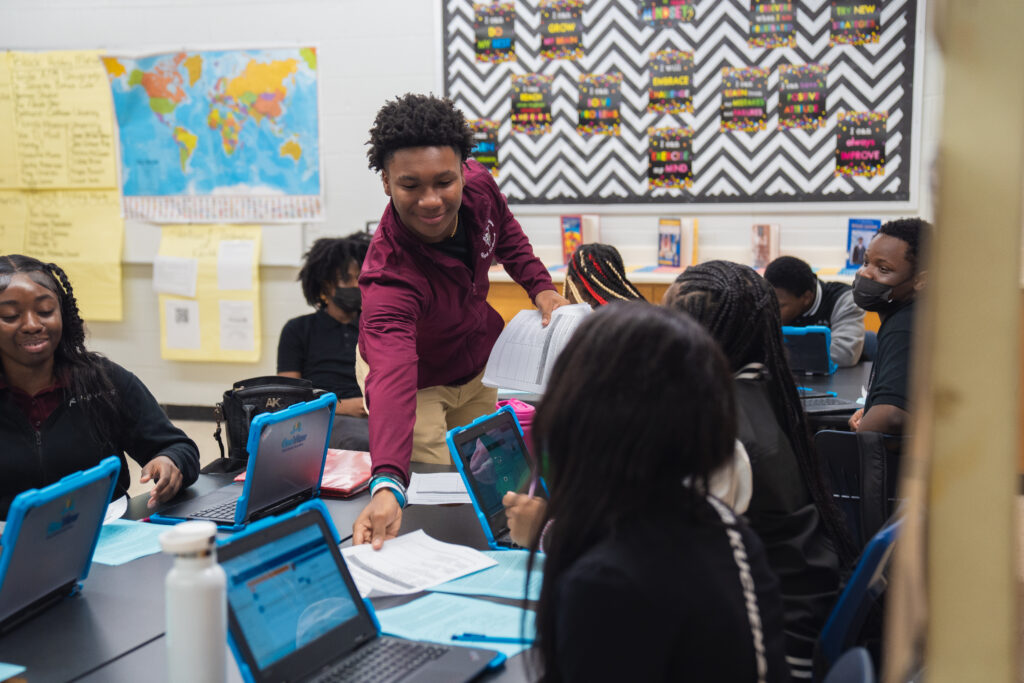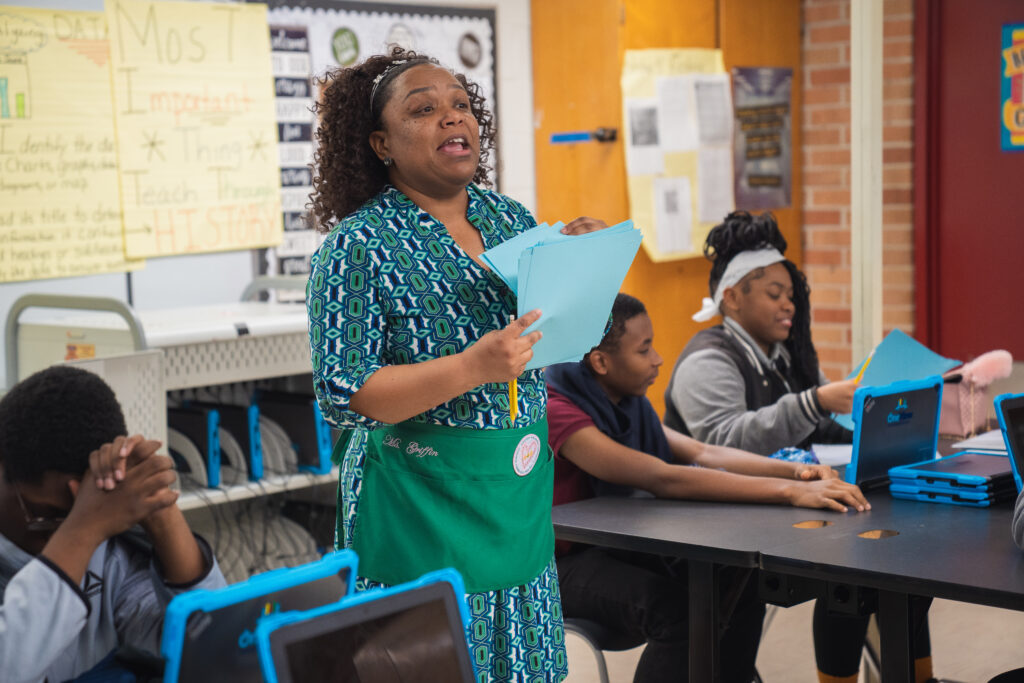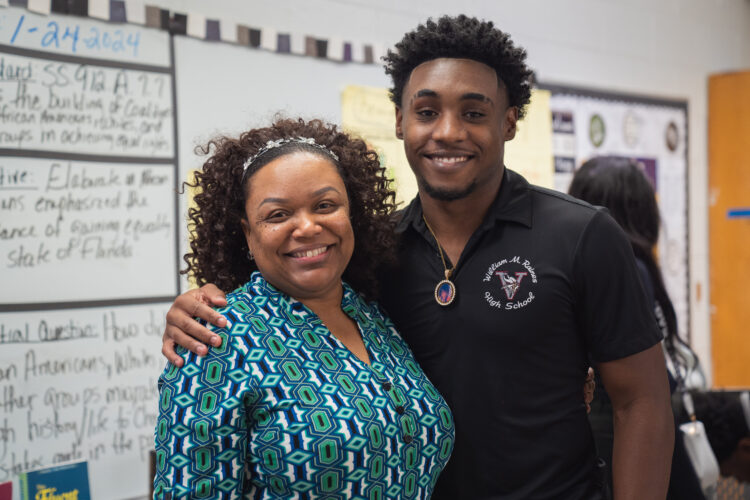Feb. 1, 2024 – For Social Studies teacher Jenecy Griffin, her first rule is simple — have fun.
“There’s never a dull moment when it comes to learning history,” shares the William M. Raines High School educator with a laugh. “I make it fun because I know they can remember it when it’s fun.”
Whether her students are learning through a game of Family Feud, producing “live museums,” or creating informative videos, Griffin takes pride in bringing her lessons to life, including those on Black history.
“I always reference what people have done in our community, in Jacksonville, Florida, in the state,” says Griffin. “I want everyone to know that this history is so rich, it’s so important, and we should not take it for granted.”
Griffin has a full slate of activities planned for Black History Month, including a research project and interactive presentations. But once February is over, Griffin says the lessons will continue.
“We are working hard and we’re celebrating accomplishments and everything that African Americans have done from the past to this point. And we want everyone to know.”
How Black history is taught in Duval County Public Schools
Griffin’s methods – and passion – paint just one picture of how teachers across Duval County Public Schools are incorporating Black history into their curriculum.
“Just watching our students diving in and learning local African American history and learning history that they are excited about…(it) really just fills me up,” says district director of K-12 Social Studies Erin Conklin.
Although the district offers African American History Courses – one of which is taught by Griffin – district educators are also working to embed concepts throughout the year.
“We wouldn’t really have history if we didn’t have African American history. It’s part of everything that our students learn,” Conklin explains. “Students want to know where they come from. I think it’s just so important that, as (educators), we provide them that opportunity to learn.”
At the high school level, Duval County students can enroll in a semester-long African American History course, with some schools offering an honors option. Students attending one of four middle schools — James Weldon Johnson, Springfield, Fletcher, or LaVilla — can enroll in a year-long course that counts as a high school Social Studies credit.

Every school also has class sets of an African American Studies book created by Conklin. The book includes significant Black history events and contributions in and around Jacksonville and features primary and secondary sources such as photos, newspaper articles, and interviews.
“It’s great because of my book, it’s influenced other districts to do the same thing,” says Conklin. “St. Johns County…they created one. Hillsborough County did the same thing, they created one. There are even school districts in Texas and Illinois that saw my book, and now they’ve created their own too.”
Increasing student involvement through the African American History Summer Writing Institute
District leaders have also sought to increase student involvement in Black History education. Case in point — the African American History Summer Writing Institute. For Mandarin High School senior Meika Fertil, it’s hard to miss her excitement when she talks about the program.
“There’s so much to be proud of, but you don’t get to feel that pride until you know it,” says the three-time participant. “That’s why I think Black history is just so important to have in our district. And I think it just makes people more prideful in where we are as a district.”
The writing institute formally launched in Summer 2021. For three weeks, students engage with local history by hearing guest speakers, taking field trips, conducting research, and presenting projects that teachers can later incorporate into their curriculum.
Through the institute, Fertil has learned more about the Ritz Theater, the LaVilla neighborhood, Afro-American Life Insurance Company founder Abraham Lincoln Lewis, and civil rights activist Rodney Hurst.
“You don’t even realize how much you’re seeing history unfold in front of your eyes until it’s there,” she says. “The more you learn history from where you are, you start to look at things differently. You not only get a sense of identity and a sense of self, but you also kind of become more confident in the place you are because you know its roots.”
It’s that sense of pride that drives educators like Conklin to provide students with as many opportunities and experiences as possible.
“It makes me want to go out there more and more and…try to find new ways that we can bring history alive to our students. And their history.”
Community involvement and exemplary status

Conklin goes on to share that as district leaders seek to improve and expand Black history education, involving the community is important. Through the district’s African American History Task Force – a group consisting of stakeholders ranging from students to board members to university partners and to parents – meetings are held every other month to discuss curriculum and explore opportunities.
“It’s a way for us to communicate with the community and our city and let them know…hey, we are doing this…despite what you hear or see in the news,” says Conklin.
What’s more is that Duval County Public Schools is also recognized as an Exemplary School District by the Commissioner of Education’s African American History Task Force. This distinction celebrates the district’s commitment to African American History instruction in the classroom. More can be read on our Celebrating Black History Month page.
For teachers like Griffin, just knowing that her school and the district prioritize Black history is priceless.
“The halls that we walk every day, somebody paid the pathway for us to be able to sit in a classroom and learn,” says Griffin. “So as a teacher, it’s my job to come into the classroom and tell the stories (that are) right in our communities.”








